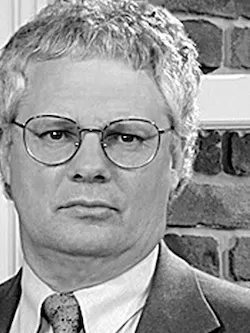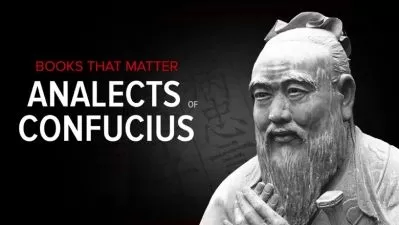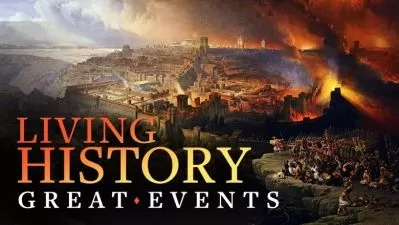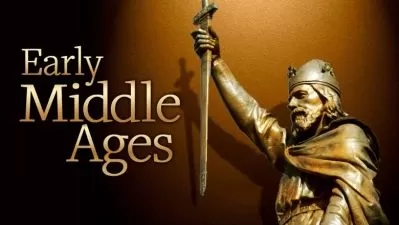European Thought and Culture in the 20th Century
Lloyd Kramer
12:14:28
Description
Who were the great thinkers of the 20th Century? They were poets and painters, novelists and scientists, philosophers and playwrights. Their ideas and debates decisively shaped 20th-century European culture and still define our world today. Now with this sequel to his series on European Thought and Culture in the 19th Century, Professor Lloyd Kramer introduces an amazing array of thinkers and writers, the key historical circumstances and challenges they faced, and the fascinating and subtle ways their works relate to one another and to the larger story of modern European culture.
Who Were the Key Thinkers of the 20th Century?
Professor Kramer's gift for exposition is used to maximum effect as he guides you through a clear and comprehensive series of lectures discussing dozens of influential figures in European thought and letters. They include:
- Poets, playwrights, novelists, and memoirists including Stéphane Mallarmé, Arthur Rimbaud, Émile Zola, Joseph Conrad, Henrik Ibsen, James Joyce, Marcel Proust, W. B. Yeats, Wilfred Owen, Siegfried Sassoon, T. S. Eliot, Franz Kafka, Thomas Mann, Virginia Woolf, George Orwell, Günther Grass, Primo Levi, and Václav Havel
- Painters such as Henri Matisse, Pablo Picasso, Georges Braque, and Wassily Kandinsky
- Philosophers and theorists including Henri Bergson, Ludwig Wittgenstein, Albert Einstein, Edmund Husserl, Martin Heidegger, Friedrich Nietzsche, Jean-Paul Sartre, Karl Jaspers, Michel Foucault, Jacques Derrida, and Jürgen Habermas
- Social scientists such as Émile Durkheim, Max Weber, Marcel Mauss, John Maynard Keynes, Hannah Arendt, Jacques Lacan, Marc Bloch, Fernand Braudel, Claude Lévi-Strauss, Carl Jung, and Sigmund Freud.
Which Intellectual Movements Are Discussed?
By learning about their lives, their works, and the connections among their ideas, you'll gain a keener insight into a host of movements and trends in modern intellectual life:
- Positivism
- Literary realism and naturalism, symbolism, and modernism
- Impressionism, Fauvism, Cubism, and Abstract Expressionism, Dadaism, Surrealism
- Existentialism
- Analytic philosophy
- Feminism
- Depth psychology, including Freudian psychoanalysis and Jungian psychology
- Revisionist Marxism
- Keynesian and Hayekian neoliberalism
- Structuralism and poststructuralism
- Postmodernism.
Ideas in Context
Professor Kramer constantly casts an inquiring eye on the evolving contexts in which leading writers and theorists developed their ideas.
He takes ideas seriously on their own terms. Important texts or artistic creations do not simply reflect the contexts in which they appear; creative thinkers are always interpreting, redefining, criticizing, and influencing the historical world in which they live. But Professor Kramer believes that your efforts to achieve historical understanding require knowledge of more than what these thinkers said.
You learn who they were, how they saw the problems of their age, and which historical realities affected the birth and spread of their thoughts.
The many intellectual achievements discussed in this course took place, after all, against a background of tumultuous, intensely challenging events and trends, including:
- Global war
- Economic depression
- The rise and fall of empires
- Massive social and technological changes.
You find that Professor Kramer skillfully presents this essential context in ways that illuminate your understanding of each thinker's works.
The Ongoing Dialogue
You might think of this course as a chapter from a larger story. That larger story is the old-but-always-renewed debate at the heart of Western civilization between Athens (standing in for "reason" or "science," broadly construed) and Jerusalem (standing in for "revelation" or "the numinous," equally broadly construed).
Twentieth-century intellectual and cultural history, Professor Kramer suggests, is an installment in this ancient and creative process of give-and-take between the dynamic poles of European civilization.
The century began with scientific positivism riding high and casting a long shadow. But just as the 18th-century Enlightenment had aroused a response in the form of Romanticism and the historical school, so too did fin-de-siècle positivism draw its share of critics.
Writers dissatisfied with the depictions of life they found in the realistic novels of, say, Zola, turned to symbolism and the world of inner visions and hidden meanings.
Philosophers and scientists like Bergson and Einstein pointed to the limits of the Newtonian model of science. Likewise, critical intellectuals such as Nietzsche, Weber, and Conrad raised sharp questions about the confident popular belief in almost-automatic progress even before the cataclysmic horrors of World War I. In the wake of World War II, Existentialist writers such as Sartre and Camus affirmed human freedom.
A New Generation of Scholars and Their Questions
It was not long before a new generation of scholars such as Claude Lévi-Strauss and the Annales historians began to ask questions.
They wondered whether profound "structures"—of language, society, history, and consciousness itself—may constrain liberty in ways far deeper than were dreamed of in Existentialist essays on the need for commitment.
In lecture after lecture, you find that Professor Kramer is superb at explaining the debates and thematic disagreements, implicit and explicit, that have resurfaced in European intellectual life.
Whether discussing the dispute between Jung and Freud, the reasons Matisse rejected representational painting, or Michel Foucault's critique of the Enlightenment, Professor Kramer's eye for patterns and lines of conflict or influence are razor sharp. He lends coherence and liveliness to what might otherwise seem a bewildering gathering of intellectuals.
A Century's Three Eras
Chronologically, the lectures fall into three parts of eight lectures each:
- Cultural innovations during the three decades before 1914
- Responses to World War I and the cultural themes of what historians call the "interwar" era
- Responses to World War II and the forms of thought that emerged in the decades after 1945.
Professor Kramer is very clear about what he believes you can get out of these lectures. "Our objective throughout this course is to understand the ideas of influential 20th-century European thinkers, to reflect on the interactions between ideas and historical contexts, and to think critically about how the ideas of creative 20th-century writers continue to raise questions for our own time.
"Intellectual history analyzes the evolving dialogues among the people of other places and times, but it also emphasizes the importance of sustaining a critical dialogue between the present and the past.
"This course seeks to expand our dialogue with the intellectual world of 20th-century Europe and to show how the challenging ideas of that historical era are still vital components of the world's contemporary cultural life."
More details
User Reviews
Rating
Lloyd Kramer
Instructor's CoursesDr. Lloyd Kramer is the Dean E. Smith Distinguished Term Professor of History at The University of North Carolina at Chapel Hill, where he has taught since 1986. He earned his B.A. from Maryville College and his M.A. in History from Boston College. He earned his Ph.D. in European Intellectual History from Cornell University. Prior to taking his position at UNC, Professor Kramer held teaching positions at Northwestern University, Stanford University, and Cornell University. At UNC, Dr. Kramer is the recipient of the Johnston Teaching Award for Distinguished Undergraduate Teaching (1997) and the 1993 Outstanding Undergraduate Teaching Award. He teaches courses on European intellectual history, the history of Western civilization, and modern global history. He has published numerous articles and is the author of Nationalism: Political Cultures in Europe and America, 1775-1865 and Lafayette in Two Worlds: Public Cultures and Personal Identities in an Age of Revolutions (1996), which received the Gilbert Chinard Prize from the American Society for French Historical Studies and the Annibel Jenkins Biography Prize from the American Society for Eighteenth-Century Studies.

The Great Courses
View courses The Great Courses- language english
- Training sessions 25
- duration 12:14:28
- English subtitles has
- Release Date 2023/05/09






















